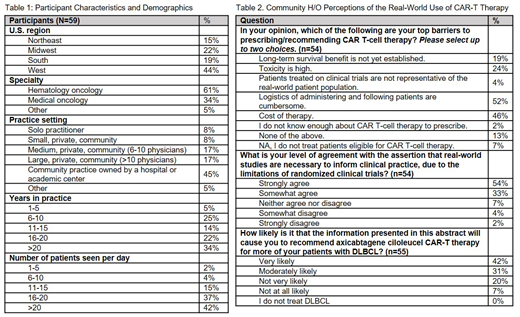Introduction
The ASH Annual Meeting is a venue for presentation of outcomes data from key clinical trials in hematologic malignancies and novel drug classes used to treat them. The approval of two CAR-T therapies, axicabtagene ciloleucel (axi-cel) and tisagenlecleucel (tis-cel), in the treatment of large B-cell lymphoma (LBCL), including diffuse LBCL (DLBCL), has ushered in a new class of drugs, i.e. cellular therapy. At ASH 2018, Nastoupil et al. presented data from a retrospective analysis of the characteristics and outcomes of patients with relapsed/refractory LBCL, including DLBCL, treated with commercially available axi-cel CAR-T therapy at academic centers in the United States (Nastoupil LJ, et al. Blood. 2018;132[Suppl 1]:91). The authors found that early outcomes of real-world patients receiving axi-cel therapy were comparable to those observed in the clinical trial population, despite >40% of these patients failing to meet the clinical trial eligibility criteria. At a live meeting in February 2019, we sought the perceptions of community hematologists and oncologists (H/O) regarding their use of, referrals for and barriers to CAR-T therapy as well their perception of the value of the real-world evidence (RWE) presented.
Methods
A live meeting in February 2019 convened H/O with geographic representation from across the United States. The participants were shown data from selected oral and/or poster presentations from the 2018 ASH Annual Meeting and responded to questions regarding their perceptions of the data and its potential impact on current practice. Participants submitted their demographic responses via a web-based survey prior to the meeting and data impression responses via an audience response system at the live meeting.
Results
Among the 59 H/O who participated in this live market research program on February 22-23, 2019, 61% identified their primary specialty as hematology/oncology and 34% medical oncology. Only 27% of H/O had attended the 60th ASH Annual Meeting in December 2018. The participants were mostly community-based physicians, 50% in private community and 45% in community practices owned by a hospital or academic center. One-third have been in practice for over 20 years, one-third for 11-20 years and one-third for 10 or fewer years. This group sees an average of 20+ patients per day and reported B-cell non-Hodgkin lymphoma as one of the three most common hematologic malignancy they managed.
28% of H/O indicated that they have referred one patient and 24% have referred 2-5 patients for CAR-T therapy since the first approval on August 30, 2017. Of those H/O who had referred patients for CAR-T therapy, 45% indicated that none of their patients had yet received the infusion.
The top two barriers to prescribing/recommending CAR-T therapy, as reported by the H/O, were the cumbersome logistics of administering therapy and following patients (52%), and the cost of the therapy (46%). Other concerns included high toxicity (24%) and lack of long-term survival data (19%), but not lack of knowledge of CAR-T therapy (2%). Furthermore, 87% of H/O agreed with the assertion that due to the limitations of randomized clinical trials, RWE is necessary to inform clinical practice. After review of the information presented on the real-world use of axi-cel, 73% of H/O indicated that this information is likely to cause them to recommend CAR-T therapy for more of their patients with DLBCL.
Conclusions
There is significant interest in adopting and using CAR-T therapies in LBCL amongst community H/O. This group does not perceive itself as lacking in knowledge regarding CAR-T therapy. The significant barriers of logistics and cost are potential deterrents to appropriate use. These results can inform stakeholders (manufacturers, payers, hospitals and practices) regarding the need to improve processes and develop payment models to address cost in order to facilitate access of these agents to the appropriate patients. RWE is viewed favorably by the vast majority of community H/O to inform clinical practice, due to the limitations of randomized clinical trials.
Gajra:Cardinal Health: Employment. Sweat:Cardinal Health: Employment. Jeune-Smith:Cardinal Health: Employment. Kish:Cardinal Health: Employment. Feinberg:Cardinal Health: Employment.
Author notes
Asterisk with author names denotes non-ASH members.


This feature is available to Subscribers Only
Sign In or Create an Account Close Modal